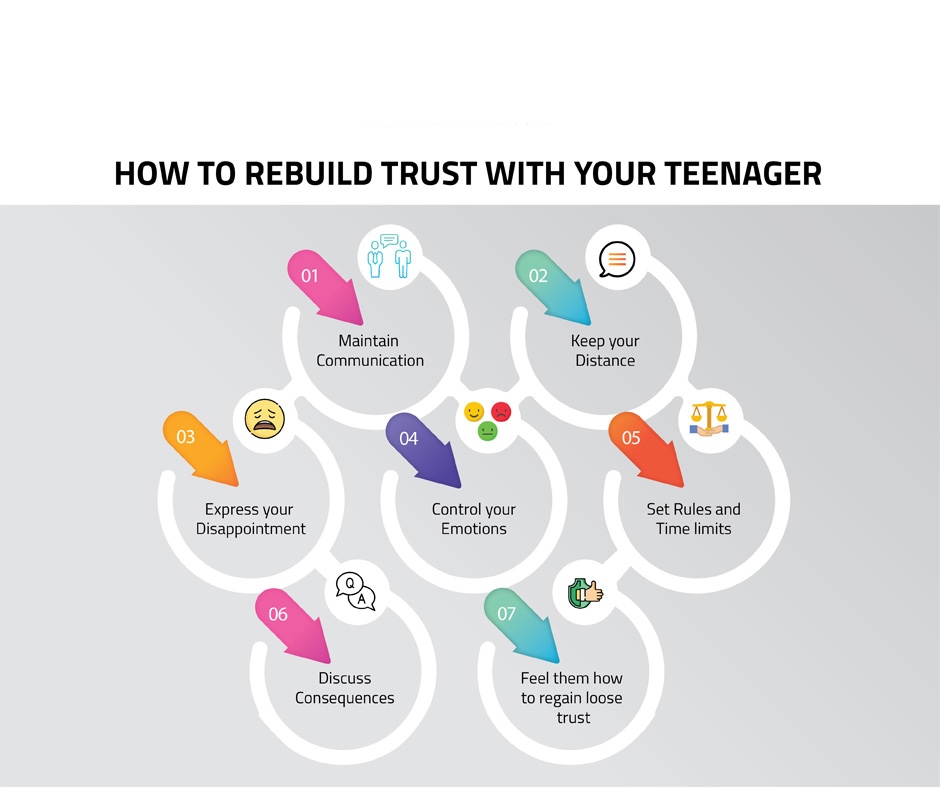Dealing With Teenage Lying And Breaching Of Trust For Parents Of Troubled Teens
Through the turbulences of teenage life, it is not uncommon for children to lie to their parents. When tackling lying teenagers, it’s important to deal with them in a calm and rational manner. It’s not easy but try to work towards a solution rather than dwelling on the hurt. Here are a few ideas on how to rebuild trust after lying with your teenager.
7 Ways to Rebuilding Trust Between Parents and Teens
Here are some ideas to address How do I gain my child’s trust back?
1. Maintain Communication
Being lied to always feels hurtful, no matter who it is or what they’ve lied about. Big issues or small, lying about things only makes it worse when the truth eventually comes out. However, the pain of being lied to by your own child surpasses all other kinds of hurt. You feel like your son or daughter betrayed you, and the bitterness of that makes it difficult to even look at them. But if there’s any hope for reconciliation and rebuilding of trust, it can only be if you continue to communicate with your child.
2. Keep Your Distance
Try to understand why teenagers lie and why yours did in particular, but you should also let them feel guilty. Guilt is an underrated, important emotion that helps people, even teenagers, to keep from repeating their mistakes. You should maintain communication with a lying teenager who’s been caught, but don’t forgive too soon. People don’t value things they get easily; don’t forgive them till they’ve earned it. Remembering this feeling and this experience will play a big part in ensuring they don’t lie to you again.
3. Express Your Disappointment
This is not meant to be an attempt to guilt-trip a lying teenager into submission and cooperation. Your teenager needs to know what you went through, so they can judge if their actions were worth it. Especially for parents who have hitherto strong relationships with their teenage children, this can be tough. Such a conversation is at great risk of turning too emotional, which you must avoid at all costs.
4. Control Your Emotions
Emotions have a way of clouding judgement, and in a conversation with an errant teenager, they can disrupt everything. You have a moral high ground in this discussion, but you will lose that if you shout at your child. Melodrama is certainly a bad idea, but even overly sentimental speeches can have the same effect. If your lying teenager thinks you’re trying to manipulate them, they will get defensive in a single blink. No progress can ever be made with a defensive teenager. So, don’t lose your calm even while telling them you feel.
5. Discuss Consequences
Inconsequential actions are easy to forget, so make sure you talk about consequences for your lying teenager. They’re close to being adults, so let them have a say in this matter, too. Steam-rolling over their opinions or refusing to listen to explanations allows your children to feel misunderstood. Hear them out, ask for their opinions while deciding what consequences your child will have to face for his or her actions. This will also help you gauge whether your child has understood his or her mistake or not.
6. Set Rules And Time Limits
Punishment for lying teenagers cannot be vague and they cannot be dragged on for too long. Lay down clear guidelines so that the punishment serves its purpose and does no damage to your relationship. Let your teenager know how long they should expect to be chastised for and make sure you let go afterwards. If the punishment feels unfair, dragged-out or otherwise inappropriate, anger will replace guilt and it’ll all become pointless.
7. Tell Them How To Regain Lost Trust
Last but not the least, make sure your teenager knows that this is not the end of your love for them. Feeling like nothing they do will make a difference can drive troubled teens away from you and into deeper trouble. Make it clear that you are interested in making things better, and let them know what you expect them to do.

Teenage lying can be a shattering experience for parents of troubled teens, but the key is never to give up on your child. Ensuring that they know exactly where you stand on the issue can resolve most of the problem right there. Beyond that, it’s only a matter of perseverance and time before the wounds heal.








Be the first one to comment on this story.